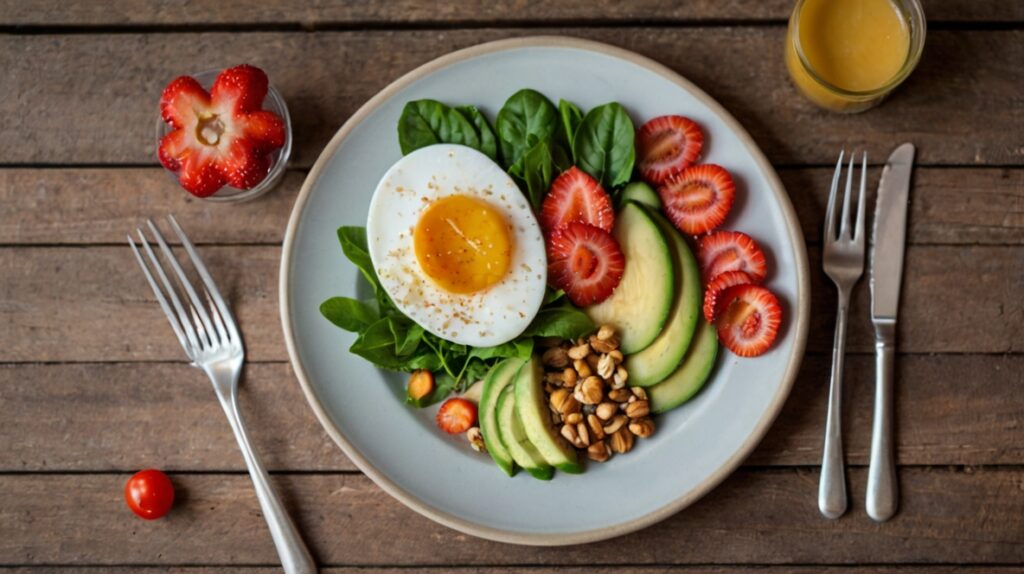Effective Strategies for Maintaining a Plant-Based Diet

Switching to and maintaining a plant-based diet can transform your life in ways you might not expect. These diets offer incredible benefits, from improving heart health to reducing the risk of chronic diseases like type 2 diabetes and hypertension. Studies even show they can lower cholesterol and blood pressure while helping with weight management. Beyond health, they support environmental sustainability by reducing carbon footprints and conserving resources. However, I know it’s not always easy. Social gatherings, time constraints, and concerns about nutrients can feel overwhelming. But trust me, with the right approach, embracing a plant-based diet becomes both achievable and deeply rewarding.
Key Takeaways
Start your plant-based journey gradually by swapping one meal at a time to build confidence and ease into the lifestyle.
Meal planning is essential; create weekly menus and stock your pantry with staples like beans, lentils, and whole grains to simplify cooking.
Experiment with new plant-based foods and recipes to keep your meals exciting and discover new flavors that you love.
Communicate your dietary preferences in social situations and bring a plant-based dish to share, making it easier to enjoy gatherings.
Focus on key nutrients like Vitamin B12, iron, and omega-3s to ensure a balanced diet; consider consulting a dietitian for personalized advice.
Stay motivated by reflecting on the benefits of a plant-based diet and keeping a journal of your progress and new discoveries.
Prepare for different scenarios, like traveling or dining out, by researching options and packing snacks to stay on track.
Getting Started with Plant-Based Diets
Transitioning Gradually to a Plant-Based Diet
When I first started exploring plant-based diets, I didn’t dive in all at once. Instead, I took small, manageable steps. One of the easiest ways to begin is by swapping out just one meal a day or even one meal a week for a plant-based option. For example, I started with oatmeal topped with fresh fruit and nuts for breakfast. It felt simple and satisfying, and it didn’t overwhelm me.
Another fun way to ease into this lifestyle is by experimenting with plant-based versions of your favorite dishes. Love tacos? Try them with black beans or lentils instead of meat. Craving pasta? Whip up a creamy cashew-based Alfredo sauce. I remember the first time I made a plant-based burger using chickpeas and spices—it was a game-changer. These small changes helped me build confidence and excitement about my new diet.
Meal Planning and Stocking Up on Plant-Based Food
Planning ahead made all the difference for me. I started creating weekly meal plans to stay organized and avoid last-minute stress. Knowing what I’d eat each day kept me on track and saved me time. I’d sit down on Sundays, jot down a few recipes I wanted to try, and make a shopping list.
Stocking my pantry with essentials also became a lifesaver. I always keep staples like beans, lentils, whole grains, and spices on hand. These ingredients form the foundation of so many healthy meals. For instance, with just quinoa, canned chickpeas, and some veggies, I can throw together a quick and nutritious salad. Having these basics ready to go makes cooking plant-based food feel effortless.

Exploring Plant-Based Foods and Recipes
One of the most exciting parts of adopting a plant-based diet is discovering new foods and flavors. I quickly learned that plant-based protein sources like tofu, tempeh, and legumes are incredibly versatile. Tofu, for example, can be stir-fried, baked, or blended into creamy sauces. Tempeh adds a hearty texture to sandwiches or stir-fries. And legumes like lentils and black beans are perfect for soups, stews, and even burgers.
I also started trying new fruits and vegetables I’d never cooked with before. Have you ever roasted Brussels sprouts with a drizzle of maple syrup? Or grilled pineapple for a sweet and smoky treat? Experimenting with different cooking methods kept my meals exciting and full of variety. I even began exploring vegan recipes online, which opened up a world of possibilities. From hearty curries to decadent desserts, there’s no shortage of inspiration.
“I began incorporating a lot more fruit, vegetables, whole grains, and legumes into my diet, and cutting way back on dairy, eggs, and processed foods. The results were dramatic—I lost weight, my skin cleared up, and my energy level skyrocketed.”
— A personal account from someone who transitioned to a plant-based diet.
The key is to stay curious and adventurous. Trying new recipes and plant foods not only keeps things fresh but also helps you discover what you truly enjoy. Over time, these small efforts add up, making the transition to a plant-based lifestyle feel natural and rewarding.
Overcoming Challenges on a Plant-Based Diet
Managing Social Situations and Peer Pressure
Navigating social events while sticking to a plant-based diet can feel tricky at first. I’ve learned that clear communication makes all the difference. When I’m invited to a gathering, I let the host know about my dietary preferences ahead of time. This way, they’re not caught off guard, and I can avoid any awkward moments at the table.
Bringing a plant-based dish to share has become my go-to strategy. Not only does it ensure I have something delicious to eat, but it also introduces others to the flavors and variety of plant-based foods. I’ve noticed that my dishes, like a hearty bean chili or baked veggie pasta, often disappear first. It’s a great way to show how satisfying plant-based meals can be. As Sharon Palmer, MSFS, RDN, puts it, “I always bring along a delicious plant-based dish to every dinner party I’m invited to. Usually, my dish is the first one to disappear at the table—even if I’m the only plant-based diner.”
For more casual settings, I keep snacks like nuts or vegan jerky on hand. These quick bites help me stay full and avoid feeling left out when plant-based options are limited. It’s all about being prepared and making the experience enjoyable for everyone.
Handling Cravings and Old Habits
Cravings for comfort foods can sneak up, especially in the early days of transitioning. I’ve found that finding plant-based alternatives to my favorite dishes helps a lot. For example, when I miss cheesy pasta, I whip up a creamy cashew-based sauce. If I’m craving something sweet, I make brownies with black beans or avocado. These swaps satisfy my cravings without compromising my goals.
Staying motivated also comes down to focusing on the benefits of plant-based diets. I remind myself of how much better I feel—more energy, clearer skin, and a lighter conscience knowing I’m making choices that align with my values. Whenever I feel tempted to revert to old habits, I think about these positive changes. It keeps me grounded and excited to continue.
Saving Time with Meal Prep
Time was one of my biggest challenges when I started. But meal prep turned things around for me. I now dedicate a couple of hours each week to batch cooking. I prepare staples like quinoa, roasted veggies, and lentil soup in advance. Then, I portion them into containers and freeze some for later. On busy days, I just reheat and enjoy a healthy meal without any hassle.
Quick and easy recipes have also become lifesavers. Stir-fries, grain bowls, and wraps take less than 20 minutes to make. Having a few go-to recipes in my back pocket ensures I never feel overwhelmed. As Heather Borders, MBA, RD, LD/N, suggests, “Frozen foods, cereals, fruits are great options. That way I know I’ll have something to eat and there is something to offer others as well.” With a little planning, sticking to a plant-based diet feels effortless, even on the busiest days.
Ensuring Nutritional Balance in Plant-Based Diets
Maintaining proper nutrition on a plant-based diet requires a bit of planning, but it’s entirely doable. I’ve learned that focusing on key nutrients and diversifying my meals keeps me feeling my best. Let me share what works for me.
Key Nutrients to Focus On
Vitamin B12: Include fortified foods or supplements.
Vitamin B12 is one nutrient I never overlook. It’s essential for energy and brain health, but it’s not naturally found in plant-based foods. I make sure to include fortified options like plant-based milks, cereals, and nutritional yeast in my meals. For added peace of mind, I take a B12 supplement. Research highlights that even with fortified foods, supplementation is often necessary to prevent deficiencies. This small step ensures I stay energized and sharp.
Iron: Pair plant-based iron sources with vitamin C for better absorption.
Iron is another nutrient I pay close attention to. Foods like lentils, chickpeas, spinach, and tofu are rich in plant-based iron. To help my body absorb it better, I pair these with vitamin C-rich foods. For example, I’ll squeeze lemon juice over a spinach salad or enjoy a side of orange slices with my lentil soup. This simple trick has made a noticeable difference in my energy levels.
Omega-3s: Incorporate flaxseeds, chia seeds, and walnuts.
Omega-3 fatty acids play a vital role in heart and brain health. I’ve found that adding flaxseeds, chia seeds, and walnuts to my meals is an easy way to get these essential fats. I sprinkle ground flaxseeds on oatmeal, mix chia seeds into smoothies, and snack on walnuts throughout the day. These small additions pack a big nutritional punch.
Diversifying Your Plant-Based Food Choices
Eat a variety of whole foods to cover all nutrient bases.
Eating a wide range of whole foods has been a game-changer for me. Whole grains like quinoa and brown rice, legumes, nuts, seeds, fruits, and vegetables form the foundation of my meals. This variety ensures I get a balance of vitamins, minerals, and fiber. Plus, it keeps my meals exciting and flavorful. A whole foods plant-based diet doesn’t feel restrictive when there’s so much to explore.
Consider consulting a dietitian for personalized advice.
When I first started, I consulted a dietitian to make sure I was meeting all my nutritional needs. They helped me create a plan tailored to my lifestyle and preferences. If you’re unsure about your nutrition or have specific health goals, I highly recommend seeking professional guidance. It’s a great way to build confidence in your choices and ensure long-term success.
“A well-balanced plant-based diet can provide all the nutrients your body needs, but it requires thoughtful planning and variety.”
— A takeaway from nutrition experts.
By focusing on these strategies, I’ve found that a whole-food vegan diet not only supports my health but also feels sustainable and enjoyable. The benefits of eating this way—more energy, better digestion, and overall well-being—make the effort worthwhile.
Sustaining Long-Term Success with a Plant-Based Diet
Building a Support System
I’ve found that having a support system makes sticking to a plant-based journey so much easier. When I first started, I joined a few online communities dedicated to vegan lifestyles. These groups became a treasure trove of advice, recipes, and encouragement. Whether it was a question about substitutions or just needing a little motivation, the members always had my back. Local meetups also helped me connect with like-minded people. Sharing experiences with others who understand your goals can be incredibly uplifting.
I also made it a point to share my journey with friends and family. At first, I worried they wouldn’t understand, but opening up about my reasons for choosing this path brought us closer. Some even became curious and started trying vegan fare themselves. Having their encouragement made me feel supported and confident in my choices.
Staying Inspired and Motivated
Keeping things fresh and exciting has been key to staying on this healthy vegan path. I love experimenting with new recipes and cuisines. One week, I might dive into Mediterranean-inspired dishes with hummus and roasted veggies. The next, I’ll try my hand at spicy Thai curries. Exploring different flavors keeps me from falling into a rut and makes every meal something to look forward to.
Whenever I feel my motivation slipping, I take a moment to reflect on why I chose this lifestyle. For me, it’s about health, sustainability, and compassion. Thinking about the positive impact I’m making helps me stay committed. I also keep a journal where I jot down small wins, like discovering a new favorite dish or noticing how much better I feel. These reminders keep me inspired to continue.
Adapting to Different Scenarios
Traveling on a plant-based diet used to feel daunting, but I’ve learned a few tricks to make it manageable. Before any trip, I research restaurants in the area that offer vegan options. Apps and websites dedicated to plant-based dining have been lifesavers. Knowing where I can find a good meal ahead of time takes the stress out of traveling.
I also pack snacks and simple meals for the road. Things like trail mix, fruit, or even a homemade wrap keep me fueled and on track. On longer trips, I bring easy-to-make items like instant oats or soup packets. These small preparations ensure I always have something satisfying to eat, no matter where I am.
Adapting to dining out has also become second nature. I check menus online before heading to restaurants and don’t hesitate to ask for modifications. Most places are happy to accommodate, and I’ve discovered some amazing plant-based dishes this way. Staying flexible and prepared has made navigating different scenarios much smoother.
“Success on a plant-based diet isn’t about perfection—it’s about finding what works for you and staying consistent.”
By building a strong support system, staying curious about new foods, and preparing for different situations, I’ve found that maintaining a vegan lifestyle feels natural and enjoyable. Every step forward reinforces my commitment to this fulfilling way of life.
Maintaining a plant-based diet becomes easier when you focus on small, consistent steps. Starting gradually, like swapping one meal at a time, helps build lasting habits. Overcoming challenges, such as cravings or social pressures, gets simpler with preparation and a positive mindset. Planning meals and ensuring nutritional balance keep you energized and motivated. Remember, it’s not about perfection—it’s about what you do consistently. Celebrate your progress, stay curious about new foods, and enjoy the benefits of this lifestyle. With preparation and determination, you’ll find success on this rewarding journey.
https://fiscalfitnessflow.com/index.php/2024/08/26/foods-to-limit-for-erectile-health/
FAQ
Will I get enough nutrients on a plant-based diet?
A well-planned plant-based diet provides all the nutrients your body needs. I focus on eating a variety of whole foods to cover my bases. For iron, I include lentils, spinach, and tofu, pairing them with vitamin C-rich foods like oranges to boost absorption. For omega-3s, I add flaxseeds, chia seeds, and walnuts to my meals. Staying mindful of key nutrients keeps me feeling my best.
How do I deal with social situations as a plant-based eater?
Social events can feel tricky, but preparation helps. I let hosts know about my dietary preferences ahead of time and often bring a plant-based dish to share. This way, I have something to eat and can introduce others to delicious vegan food. For casual gatherings, I keep snacks like nuts or fruit on hand. Clear communication and a little planning make socializing stress-free.
Can kids thrive on a plant-based diet?
Yes, children can thrive on a plant-based diet with proper planning. I’ve seen families successfully raise healthy kids by focusing on nutrient-dense foods like fruits, vegetables, whole grains, legumes, and fortified products. Consulting a pediatrician or dietitian ensures kids get all the nutrients they need, including B12, iron, and calcium. It’s a great way to instill healthy eating habits early on.
What if I don’t have time to cook every day?
Meal prep is a lifesaver! I dedicate a couple of hours each week to batch cooking staples like grains, roasted veggies, and soups. Freezing portions makes busy days so much easier. Quick recipes, like stir-fries or wraps, also come in handy. With a little planning, eating plant-based doesn’t have to take much time.
How do I stay motivated to stick with a plant-based diet?
I stay motivated by reminding myself why I chose this lifestyle. For me, it’s about health, sustainability, and compassion. Reflecting on the positive changes I’ve experienced—like more energy and better digestion—keeps me inspired. Trying new recipes and cuisines also keeps things exciting. Every small step forward reinforces my commitment to this rewarding journey.






